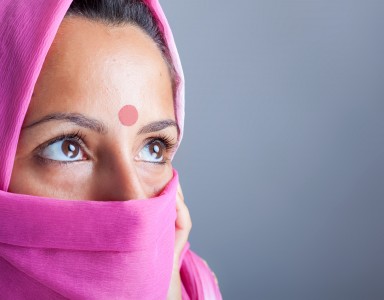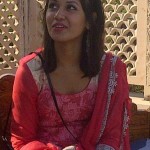
I love you, but we cannot be.
I love the way your blue eyes twinkle with emotion, and the freckles of your nose dance as you wrinkle it in delight at the sight of me.
But you see, I am Indian, and you are not, and although the colour of my skin makes not the slightest difference to you, for me it is a different story. By virtue of the simple fact that I was born as a girl, to Indian parents, I carry upon my shoulders, the burden of centuries of expectations, traditions, rituals and responsibilities that every Indian girl must bear from birth till death.
I was two years old when my parents left the shores of India forever and came here to build a new life for themselves. This was the land of dreams and opportunities; it offered them a future that India never could. The air was cool and temperate, not hot, damp and sweaty; the children were plump, fair and healthy, not weedy and malnourished; and the streets were clean and litter free, not writhing with the tangled limbs of the handicapped, destitute and starving.
I went to school with the white kids. We played together in the blissful lighthearted way that only very small children can, but I was always reminded that I was not one of them. Their kind was to be treated with suspicion, with their depraved concepts of single parenthood, divorce, boyfriends, pubs, gay rights and female bus drivers. We could live in their country, eat their food, ride their trains and occupy positions in their companies, but we remained apart from them, lest we be tempted by their sinful lifestyle and carefree ways. I was different, you see, I was an Indian girl.
I did not go for sleepovers with my friends, as their parents, however friendly, could not be trusted. As I grew up, I could no longer wear shorts or dresses on hot summer days. I was taught to cover up and not draw attention to myself. When I was 10, and the topic of my conversations among friends began to veer away from TV shows and made-up games towards boys for the first time, I was withdrawn from sex education at school. While my peers learnt about puberty and growing up, I sat alone in the library with my mother’s sharp words that there was no need for me to be learning about such things rang in my head.
I was invited to discos and movie nights and parties, but of course, I could not go. I was told that it should be my priority at all cost to stay away from boys, as they would bring nothing but shame and disrepute, and who could recover from that? If I argued that all my friends were allowed to go, I was reminded time and time again that it didn’t matter; the rules were different for Indian girls, even ones that had no living memory of India at all.
You do understand, of course, that this was all for my own good. My parents only wanted the best for me. They only wanted to give me the best education, the best career and the best shot at life in this foreign country of dreams, with no unnecessary distractions. So I did my best for them, I made sure that their sleepless nights and tears and raised voices didn’t go to waste. As you know, I finished school with top grades and secured a place at an excellent university to read the subject deemed best for me by my parents. Despite finding it both unchallenging and uninteresting, I finished top of my year, and went on to be hired by one of the largest and most reputable firms in the world. I worked 14 hour days, often seven days a week for three years and, at the end of it, received the promotion I had been working towards. I rang home, longing for my parents to share my hard earned happiness but although they congratulated me heartily, I discerned a hint of something else in their voices.
For you see, although I had done all they had asked for and succeeded in the path they had chosen for me, it didn’t matter anymore. I was 24, and an Indian girl. What use was a high flying career or a large salary – if they could not find a suitable Indian boy for me to marry and settle down with?
I see the confusion in your eyes, my love, and this was how I felt too. All my life I had been told to shun boys and focus on my education and career, and now that the fruits of my labor were at last beginning to peek out of the dense, leafy foliage, I was faced with this alarming u-turn, and told that in reality, none of this would bring my parents any satisfaction or happiness at all. My life, and their’s, would remain incomplete until they procured for me an Indian husband. They had to act now, before I grew too fond of my independence, before I began to test the boundaries of my Indian womanhood, set so painstakingly for me since childhood, before I met someone like you.
I love you but I must leave you. You can understand a daughter’s reluctance to inflict grief upon her parents by her choices. How can I explain to you why their happiness hinges not on my own happiness and trust in my abilities, but on this meticulous desire to control every aspect of my life, to tie my destiny irrevocably with this man I do not know, and do not care for?
You have shown me nothing but respect and kindness and patience in the years that I have known you, but know that he will always be preferable to you, even if he demands lavish gifts and all expenses for the wedding to be borne by my parents. For Indian men have such high standards, unlike men of your race, and he is doing me such a favor by agreeing to marry me. Who am I to be so ungrateful as to refuse?
Your parents have welcomed me into their homes and hearts with open arms, simply because you chose to love me. Yet you will never be good enough for me, even though his parents treat me like an outsider, a performer of domestic tasks, nothing more than a bedroom companion for their adult son.
My parents say that your type cannot be trusted, that if, one day, we no longer see eye to eye, you will divorce me and leave me to live your life apart. The Indian man will never do so. If our personalities are not compatible, I will be forever locked in the security and safety of the loveless marriage, and endless years of apathy, hatred and depression. Unlike you, he will never make me suffer the indignity of living as a divorced woman, with the freedom to live independently, travel the world or seek the love of another man.
And what of this baby in my tummy? Your face broke into a smile of delight when I whispered the news to you in tremulous tones. You said that we would raise him together, love him unconditionally till our dying day. But you know this can never be. The penalty for illicit love like our’s is severe, possibly even death, for there is no greater shame than this. And only an Indian parent has the strength, the unshakable mettle, to put honour, tradition and duty above all else, even an only daughter.
I love you, but this is it. I know you will understand. I am not like you, free to live and love as I please. Wherever I go, whatever I do, I will always be followed by a billion eyes, and a billion tongues, watching my every move, judging me at every turn, ready to shred me to pieces at the first sign of falter.
For I am an Indian girl, and this is the burden I have been raised to bear.
(Note: This is a work of fiction based on my experiences as an NRI growing up in London).
 Archeeta Pujari is a 23-year-old Investment Banker. Cooking, painting, writing and Harry Potter are the great loves of her life! Raised in London, but an Indian at heart, she feels strongly about the hypocrisy, misogyny and discrimination that continues to plague Indian women.
Archeeta Pujari is a 23-year-old Investment Banker. Cooking, painting, writing and Harry Potter are the great loves of her life! Raised in London, but an Indian at heart, she feels strongly about the hypocrisy, misogyny and discrimination that continues to plague Indian women.




